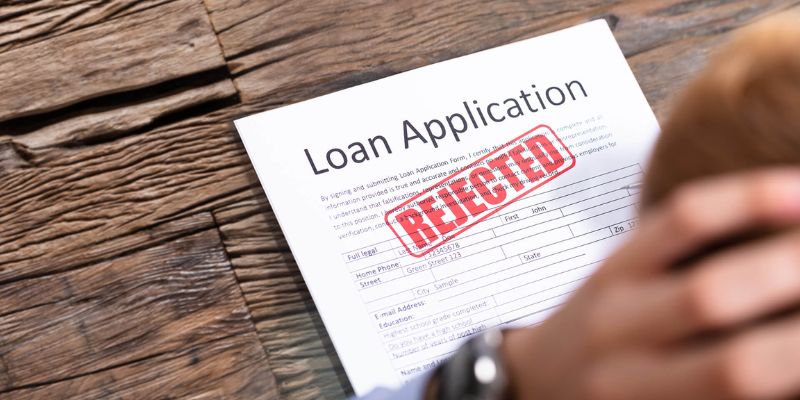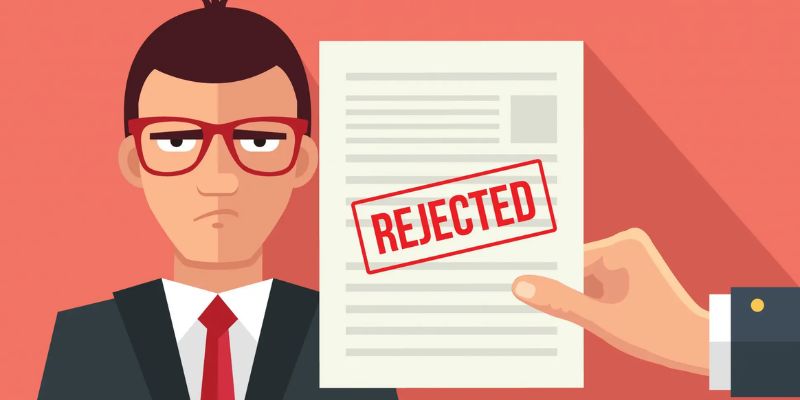Are you looking to take out a personal loan but are worried about being declined? Don’t worry – it happens. Unfortunately, in some cases, the lender cannot approve an application.
But don’t let that demotivate you; knowing why loans get declined can help give you insight into what lenders look for and how likely they might be to accept your loan. Here are five of the most common reasons why personal loans may be rejected.
Why you may have been declined for a personal loan

Poor credit score
A low credit score is one of the most common reasons personal loan applications are rejected. Lenders check your credit score to assess the risk level associated with providing you a loan; if it’s too low, they may decide not to offer you funding.
Insufficient income

Your income is also an important factor when it comes to loan approval. Lenders want to see that you have a steady source of income that can support the repayments. If they feel like your income won’t be able to cover the payments, they may reject your application.
No credit history
No credit history can be a problem when applying for a personal loan. Lenders rely on your credit report to evaluate the risk associated with approving you as part of their lending process, and without any credit history, they may not have enough information to properly assess your application. If this is the case, your loan will likely be rejected.
There are ways to build your credit history, even if you’ve never had any loan or revolving credit. One way is to get an installment loan, such as a car loan, then make sure you make all the payments on time. This will help establish a positive payment pattern in your credit report that lenders can refer to when evaluating you for a personal loan.
Too much debt
Having too much existing debt can also lead to declined loan applications. When lenders analyze your credit report, they will consider all the outstanding credit you have and decide if you can manage another loan on top of it. They may reject the application if they feel like they’re overextended already.
Too many applications
Another common reason for a declined personal loan is having too many applications. Making multiple loan requests quickly can be a red flag to lenders, indicating you’re desperate for money or trying to hide something. It’s best to research different loans and pick the one that fits you best.
Unstable employment history
Lenders want to see that you have a consistent job and source of income so that an unstable employment history can be a dealbreaker regarding loan approval. If your job history is scattered with layoffs or gaps between jobs, lenders may feel the risk of approving your application is too high.
You didn’t meet the basic requirements
One of the most common reasons for personal loan rejection is failing to meet the basic requirements of lenders. This includes having insufficient income, having too much debt, or having a poor credit score. It’s important to ensure you meet all the criteria before applying for a loan, as this will increase your chances of getting approved.
Lenders may also reject your application if your income isn’t sufficient to cover the repayments or if you have too many existing debts. Having a low credit score can also be an obstacle to loan approval. It is important to ensure that all your financial information is up-to-date and accurate before applying for a personal loan.
Missing information on your application
Missing or incorrect information on your loan application can also lead to rejection. Lenders need complete and accurate information to properly assess the risk associated with providing you financing. If any details still need to be included, they may need help to approve your application. It is important to ensure that all the information provided is accurate and up-to-date before applying.
If you’re unsure of any details, contact the lender directly and provide them with the correct information. This will help ensure that your loan request is processed quickly and accurately. Double-check all your information and ask questions before submitting your loan application. Doing so may increase your chances of getting approved for financing.
Loan purpose that didn’t meet the lender’s criteria
Another common reason for personal loan rejection is failing to meet the lender's criteria for loan purposes. Lenders typically have specific purposes in mind when they provide personal loans, and if your stated purpose fails to meet their criteria, your application may be accepted. For example, lenders may not approve a loan request for gambling or purchasing luxury items.
It's important to ensure that the loan purpose you state meets the lender's criteria before submitting your application. It’s also a good idea to research different lenders and their requirements to know what kind of loan they offer and whether your stated purpose will be accepted. Doing this can help increase your chances of getting approved for a personal loan.
These are the most common reasons personal loan applications may be rejected. Understanding the criteria and requirements of lenders can help ensure that you have an easier time getting approved for a loan.
It’s also important to ensure all your financial information is up-to-date and accurate before applying, as this will increase your chances of being approved for financing.
Knowing what to expect when you apply for a personal loan can help you better prepare yourself for the process. Doing so may give you an edge in getting your application approved and receiving the funding you need.
How to improve your chances of getting a loan
If you want to increase your chances of getting approved for a personal loan, there are several steps you can take. First, ensure all the required documents and information are ready before submitting your application. This includes proof of employment, income, and other financial details. Second, work on improving your credit score as much as possible.
The loan includes ensuring all payments are made on time and keeping your credit utilization low. Third, get organized and make sure you’re not overextending yourself financially. This means avoiding taking out too many loans or credit cards at once and being mindful of how much debt you have about your income.
Finally, shop for the best terms and rates before committing to a loan. Different lenders have different criteria and requirements, so finding the best lender for your needs is important. This will help increase your chances of getting approved for a personal loan with favorable terms and rates.
FAQS
Who approves or rejects a loan?
The lender is the one who approves or rejects a loan. The lender will evaluate an applicant's credit score, financial history, and other information to decide if they are a good candidate for financing and whether they can repay the loan amount.
What happens if a loan is rejected?
If a loan is rejected, the lender will inform the applicant and explain why their application was declined. The applicant can then take steps to improve their credit score or financial situation and apply again.
Can I reapply for a loan after it has been rejected?
Yes, you can reapply for a loan after it has been rejected. However, you must ensure that your credit score and financial situation have improved since your last application. This will increase your chances of getting approved for the loan.
Conclusion
In conclusion, it is important to remember the common reasons for personal loan rejection. The absence of a credit history, insufficient income or employment history, and debt-to-income ratio can all be factors leading to the decline of your loan application. Ensuring you have thoroughly evaluated these components of your financial environment before filling out paperwork will give you the best shot at securing the loan you seek.




